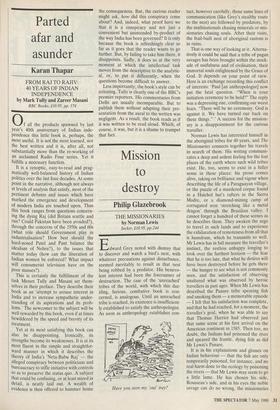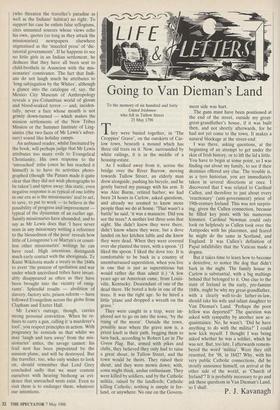Mission to destroy
Philip Glazebrook
THE MISSIONARIES by Norman Lewis
Secker, £10.95, pp.244
Edward Grey noted with dismay that to discover and watch a bird's nest, with whatever precautions against disturbance, seemed inevitably to result in that nest being robbed by a predator. His benevo- lent interest had been the forerunner of destruction. The case of the `unreached' tribes of the world, with which this daz- zling, furious, combative book is con- cerned, is analogous. Until an unreached tribe is reached, its existence is insufficient- ly established to satisfy the anthropologist. As soon as anthropology establishes con- Have you seen my 'out' tray? tact, however carefully, those same lines of communication (like Grey's stealthy route to the nest) are followed by predators, by the multinationals chasing minerals or mis- sionaries chasing souls. After their visits, the frail-built nest of aboriginal custom is in ruins.
That is one way of looking at it. Alterna- tively it could be said that a tribe of pagan savages has been brought within the stock- ade of usefulness and of civilisation, their immortal souls enlightened by the Grace of God. It depends on your point of view. Here is an exchange recording this conflict of interests: 'Paul [an anthropologist] now put the fatal question. "When is your initiation ceremony to be held?" The reply was a depressing one, confirming our worst fears. "There will be no ceremony. God is against it. We have turned our back on these things." ' A success for the mission- ary is a disappointment for the curious traveller.
Norman Lewis has interested himself in the aboriginal tribes for 40 years, and The Missionaries connects together his travels in search of them. His writing communi- cates a deep and ardent feeling for the lost places of the earth where such wild tribes exist. He, too, seems to exist in a fuller sense in these places: his prose comes alive, taking on brilliance and vigour when describing the life of a Paraguayan village, or the puzzle of a murdered corpse found in a Huichol hut's rafters in the Sierra Madre, or a diamond-mining camp of corrugated iron 'stretching like a metal dragon' through the Brazilian valley. I cannot forget a hundred of these scenes as he describes them. They awaken the urge to travel in such lands and to experience the exhilaration of remoteness from all that is humdrum, which he transmits so well. Mr Lewis has in full measure the traveller's instinct, the restless unhappy longing to look over the furthest horizon — the fear that he is too late, that what he desires will have been destroyed before he gets there — the hunger to see what is not commonly seen, and the satisfaction of observing unaltered what was observed by heroic travellers in past ages. When Mr Lewis has described the Panare tribe spearing fish and smoking them — a memorable episode — I felt that his satisfaction was complete, and that he had reached, for a moment, the traveller's goal, when he was able to say that Thomas Harriot had observed just that same scene at his first arrival on the American continent in 1585. Then too, no doubt, the Indians had poisoned the river and speared the frantic, dying fish as did Mr Lewis's Panare.
It is in his explanations and glosses on Indian behaviour — that the fish are only temporarily poisoned, for instance, and no real harm done to the ecology by poisoning the rivers — that Mr Lewis may seem to go a little lame. He has chosen his side, Rousseau's side, and in his eyes the noble savage can do no wrong, the missionaries (who threaten the traveller's paradise as well as the Indians' habitat) no right. To support his case he enlists false syllogisms, cites unnamed sources whose views echo his own, quotes (so long as they attack the missionaries) newspapers elsewhere stigmatised as the 'muzzled press' of 'dic- tatorial governments'. If he happens to see no little girls in an Indian settlement, he deduces that they have all been sent to child-brothels in Asuncion with the mis- sionaries' connivance. The fact that Indi- ans do not laugh much he attributes to 'long subjugation by the Whites', although a glance into the catalogue of, say, the Mexico City Museum of Anthropology reveals a pre-Columbian world of gloom and blood-soaked terror — and, inciden- tally, never a face whose mouth is not grimly down-turned — which makes the mission settlements of the New Tribes Mission or the Summer Institute of Ling- uistics (the two faces of Mr Lewis's adver- sary) sound like holiday camps.
An unbiased reader, whilst fascinated by the book, will perhaps judge that Mr Lewis attributes too many evils to Evangelical Christianity. His own response to the 'unreached' tribe (once he has reached it himself) is to have its activities photo- graphed (though 'the Panare made it quite clear that they did not wish photographs to be taken') and tiptoe away: this static, even negative response is as typical of one lobby in our era as is the missionaries' zeal to act, to save, to put to work — to believe in the possibility of progress and improvement — typical of the dynamism of an earlier age. Saintly missionaries have abounded, and to say as Mr Lewis does that 'I have never seen in any missionary writing a reference to the blessedness of the poor' reveals how little of Livingstone's or Martyn's or count- less other missionaries' writings he can have read. High intentions distinguish much early contact with the aboriginals. Te Kuini Wikitoria made a treaty in the 1840s to avert 'the process of spoliation and war under which uncivilised tribes have invari- ably disappeared as often as they have been brought into the vicinity of emig- rants'. Splendid results — abolition of slavery, factory acts, prison reform — have followed Evangelism across the globe from Clapham and Exeter Hall.
Mr Lewis's outrage, though, carries strong personal conviction. When he re- fuses to carry a gun, calling it 'a murderer's tool', you respect principles in action. With poignancy he reminds us that whilst we may 'laugh and turn away' from the mis- sionaries' antics, the savage cannot: his frail nest has been pinpointed by the mission plane, and will be destroyed. But the traveller, too, who only wishes to look on, should remember that Lord Grey concluded sadly that we must content ourselves with hearing birdsong as evi- dence that unreached nests exist. Even to visit them is to endanger them, whatever our intentions.























































 Previous page
Previous page